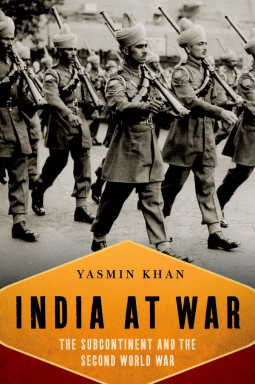
India At War
The Subcontinent and the Second World War
by Yasmin Khan
This title was previously available on NetGalley and is now archived.
Buy on Amazon
Buy on Waterstones
*This page contains affiliate links, so we may earn a small commission when you make a purchase through links on our site at no additional cost to you.
Send NetGalley books directly to your Kindle or Kindle app
1
To read on a Kindle or Kindle app, please add kindle@netgalley.com as an approved email address to receive files in your Amazon account. Click here for step-by-step instructions.
2
Also find your Kindle email address within your Amazon account, and enter it here.
Pub Date 8 Oct 2015 | Archive Date 16 Sep 2015
Description
World War II was a global catastrophe. Far broader than just the critical struggle between Allies and Axis, its ramifications were felt throughout the world. It was a time of social relocation, reorienting ideas of patriotism and geographical attachment, and forcing the movement of people across oceans and continents. In India at War, Yasmin Khan offers an account of India's role in the conflict, one that takes into consideration the social, economic, and cultural changes that occurred in South Asia between 1939 and 1945-and reveals how vital the Commonwealth's contribution was to the war effort.
Khan's sweeping work centers on the lives of ordinary Indian people, exploring the ways they were affected by a cataclysmic war with origins far beyond Indian shores. In manpower alone, India's contribution was staggering; it produced the largest volunteer army in world history, with 2.5 million men. Indians were engaged in making the raw materials and food stuffs needed by the Allies, and became involved in the construction of airstrips, barracks, hospitals, internee camps, roads and railways. Their lives were also profoundly affected by the presence of the large Allied army in the region, including not only British but American, African, and Chinese troops. Madras was bombed by the Japanese and the Andaman and Nicobar Islands were occupied, while the Bengal famine of 1943-in which perhaps three million Bengalis died-was a man-made disaster precipitated by the effects of the war.
This authoritative account offers a critically important look at the contributions of colonial manpower and resources essential to sustaining the war, and emphasizes the significant ways in which the conflict shaped modern India.
Khan's sweeping work centers on the lives of ordinary Indian people, exploring the ways they were affected by a cataclysmic war with origins far beyond Indian shores. In manpower alone, India's contribution was staggering; it produced the largest volunteer army in world history, with 2.5 million men. Indians were engaged in making the raw materials and food stuffs needed by the Allies, and became involved in the construction of airstrips, barracks, hospitals, internee camps, roads and railways. Their lives were also profoundly affected by the presence of the large Allied army in the region, including not only British but American, African, and Chinese troops. Madras was bombed by the Japanese and the Andaman and Nicobar Islands were occupied, while the Bengal famine of 1943-in which perhaps three million Bengalis died-was a man-made disaster precipitated by the effects of the war.
This authoritative account offers a critically important look at the contributions of colonial manpower and resources essential to sustaining the war, and emphasizes the significant ways in which the conflict shaped modern India.
Available Editions
| EDITION | Other Format |
| ISBN | 9780199753499 |
| PRICE | US$31.95 (USD) |





